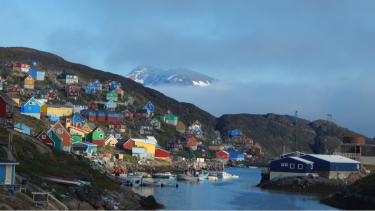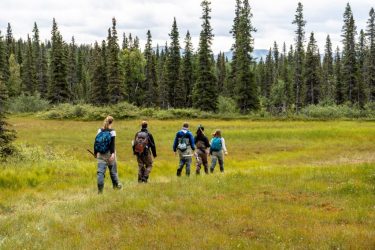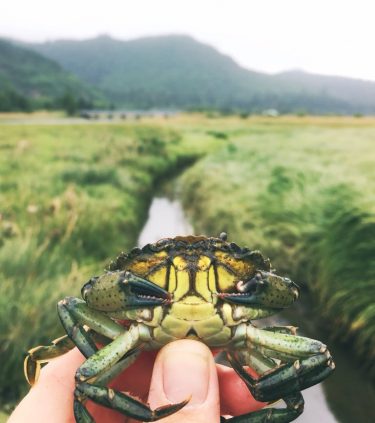For scientists and students at UW College of the Environment, summer doesn’t equate to long days spent lounging in the sun or signify the onset of a slower-paced season filled with less academic rigor. On the contrary, many researchers and scientists-in-training from UW Environment spend their summers in the field, collecting data, monitoring conditions and applying the concepts they teach and learn in the classroom in a real-world setting. Here’s a look at some of the research conducted during the summer 2018 fieldwork season from across the College’s units, schools and departments:
Studying climate change in Greenland and Denmark

From August 15 to September 10, UW Department of Earth and Sciences’ Research Assistant Professor Michelle Koutnik, ESS graduate student John Christian, and University of Bergen’s Hans Christian Steen-Larsen co-led students on a new study abroad course offering (ESS 402/ARCTIC 387). They spent a month in Greenland and Denmark learning about ice and climate up-close, as well as examining how societies are responding to current and projected climate-associated changes.
From lectures at the Danish Arctic Institute to hikes on a Greenlandic ice sheet, students cataloged their experiences in a series of blog posts available on Koutnik’s website.
Fieldwork in the forest with SEFS’ Harvey Lab
Students working with Brian Harvey, an assistant professor at the School of Environmental and Forest Sciences, got an impressive amount of work done this summer! Four grad students and 11 undergrads helped research bark beetle outbreaks in Colorado and forest fire impacts in California, Oregon, Washington and Montana. In measuring the burn severity and early post-fire conditions of the 2017 Norse Peak fire — a rare fire on the west side of the Cascades Range — the Harvey Lab will be able to track the forest’s response in the long-term.
Check out all of the Harvey Lab’s projects.
So proud of #fieldwork the #HarveyLab accomplished this summer. With research on #barkbeetle outbreaks in CO to #forestfires in CA, OR, WA and MT, we employed 4 grad students + 11(!) UG field techs. Thx 4 the hard work + drive safe back 2 Seattle! @UW_SEFS @UWEnvironment pic.twitter.com/UvoO2lqPjp
— Brian J Harvey (@Brian_J_Harvey) September 1, 2018
A summer with the Alaska Salmon Program

A group of undergraduate students took a one-of-a-kind summer course through the University of Washington’s School of Aquatic and Fishery Sciences. Nearly 2,000 miles from Seattle, they spent a month with the UW’s Alaska Salmon Program field stations on the banks of Lake Aleknagik and Lake Nerka. Along with professors Tom Quinn, Daniel Schindler, and Ray Hilborn — three of the preeminent salmon researchers in the world — the group of undergrads worked closely with graduate students conducting their own research, Alaska Salmon Program staff, and visiting researchers from around the world.
“You can sit and have a lecture anywhere, but you can’t go see salmon spawning in a stream anytime,” Liz Landefeld, a sophomore in the School of Environmental and Forest Sciences, said. “All of the professors for the program were excited for people to see what they have been lecturing about for months.”
Learn more about this course on the Aquatic and Fishery Sciences website.
Analyzing the human dimensions of marine reserves
Madison Bristol, an undergraduate student in UW Environment’s Environmental Science and Terrestrial Resource Management program, spent the summer working for Oregon Sea Grant. She spent several months helping their team better understand the impacts of marine reserve implementation. During her summer, she drove 1,060 miles and conducted 14 interviews with fishers up and down the Oregon coast. She also analyzed hundreds of written survey responses.
“I can honestly say that my perception of fishers has changed radically since coming to Oregon. They are highly satisfied with their lifestyle and are in-tune with the natural environment that their business depends upon. Many of them wish to collaborate with scientists and managers to create policies that serve the greater good, so long as their input is not used against them,” she says.
Read all about Madison’s work in this series of blog posts.
My summer as an @OregonSeaGrant Summer Scholar has changed my life. I've made connections with others passionate about #humandimensions and #environmentalpolicy, and can envisions a future for myself in these fields. Thank you. @ODFWMarine @UWEnvironment https://t.co/7DBG1puAYL
— Mads (@bristol_madison) August 25, 2018
Narwhal research in the Arctic
Kristin Laidre, an Arctic ecologist and associate professor at the School of Aquatic and Fishery Sciences, spent August studying narwhals at glacier fronts in Northwest Greenland. Specifically, Laidre and her team were looking at narwhals’ behavior at glacier fronts in Greenland. This summer was the first of a three-year research effort.
“Our cruise targeted 3 glacier fronts in Northwest Greenland where narwhals spend the summer. It was sobering to see how much these glaciers have receded. In some cases we were ‘sailing on land’ when following our GPS because the area used to be covered in permanent ice,” Laidre says.
Separately, Laidre Lab graduate students Jennifer Stern and Jessica Lindsay went to Alaska this summer to identify and document the diversity of marine mammal species commonly found in the Arctic.
Kristin’s research spans many aspects and species in Arctic ecosystems, and you can learn about all of them on her website.
Heading into Sverdrup glacier at Tuttulipaluk, NW Greenland #omgnarwhals pic.twitter.com/9MzJPyUueJ
— Dr. Kristin Laidre (@KristinLaidre) August 31, 2018

Green crab monitoring on the Olympic Peninsula
Members of the Washington Sea Grant Green Crab Team traveled to the Makah Reservation in July to participate in the tribe’s green crab trapping efforts. Working in the Wa’atch and Tsoo-Yess estuaries over three days, Washington Sea Grant’s Emily Grason and Program on the Environment and the School of Aquatic and Fishery Sciences’ P. Sean McDonald presented to a group of Makah staff and interns interested in learning more about the history of invasive European green crab, their potential impacts on local ecosystems and the work the Crab Team does through its monitoring program. While there, they pitched, set and retrieved traps, resulting in the capture of 60 green crabs.
The team’s experience is chronicled in this blog post.
This is just a sampling of summer research and fieldwork projects from around the College of the Environment. Have a summer research project or fieldwork experience you’d like for us to highlight here? Drop us an email at coenvcom@uw.edu.

